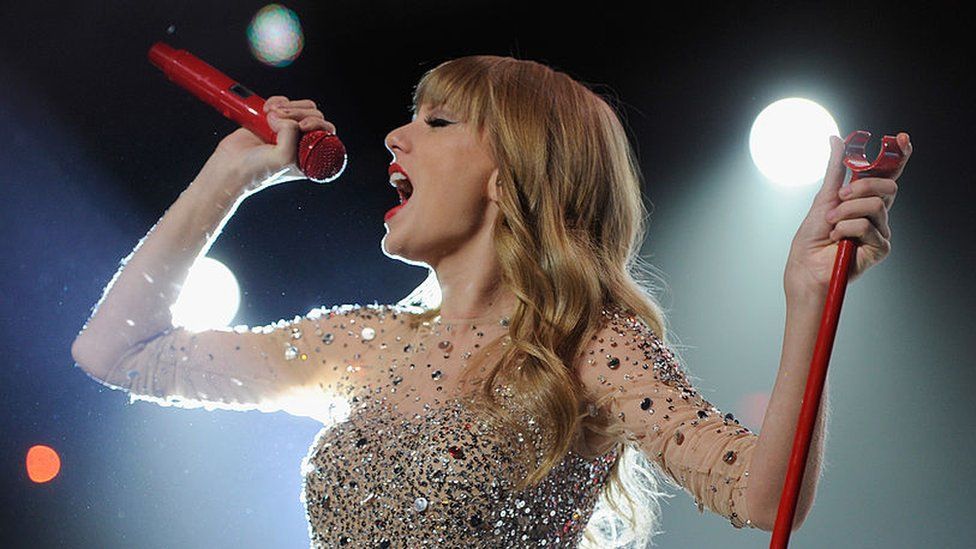
Ticketmaster apologises for Taylor Swift tour sales fiasco


Taylor Swift said it felt like fans suffered “multiple bear attacks” in their attempts to secure tickets
By Mark Savage & Jason Armesto
BBC News
Ticketmaster has apologised to Taylor Swift and her fans during a US Senate hearing, months after its system was overwhelmed by demand for her Eras Tour.
Thousands of ‘Swifties’ were unable to buy seats due to the issue.
“We need to do better and we will,” Joe Berchtold, president of Live Nation, Ticketmaster’s parent company, told lawmakers on Tuesday.
A bot attack was responsible for “a terrible consumer experience”, he said.
Ticketmaster, which merged with Live Nation in 2010, has repeatedly faced criticism from fans and politicians, who say it has too much control over the live music market and artificially inflates the cost of tickets with fees and service charges.
According to Senator Amy Klobuchar, who chairs the US Senate committee on consumer rights, Ticketmaster is responsible for 70% of ticket sales in the US.
“In truth, there is no other choice. It is a monopoly,” she told MSNBC last year.
Regarding the Swift tour, she added: “The high fees, site disruptions and cancellations that customers experienced shows how Ticketmaster’s dominant market position means the company does not face any pressure to continually innovate and improve.”
Image source, Getty Images
Senator Amy Klobuchar has criticised Ticketmaster’s dominance of the US live music market
Swift herself said it was “excruciating” to watch fans struggling to get tickets, and that she had been assured Ticketmaster could handle the demand.
In its written testimony ahead of its Tuesday grilling by US senators, the company explained for the first time how its systems had been targeted by software “bots” used to illegally obtain tickets.
The attacks came despite the use of Ticketmaster’s “verified fan” scheme, which requires customers to pre-register their interest, allowing the company to check whether they are genuine fans intending to see the show.
“We knew bots would attack… and planned accordingly,” wrote Mr Berchtold.
‘Terrible consumer experience’
“We were then hit with three times the amount of bot traffic than we had ever experienced, and for the first time in 400 Verified Fan onsales they came after our Verified Fan access code servers.
“While the bots failed to penetrate our systems or acquire any tickets, the attack required us to slow down and even pause our sales. This is what led to a terrible consumer experience that we deeply regret.”
Mr Berchtold also acknowledged that the company should have staggered the sales “over a longer period of time” to stop its systems being overloaded, and that it should have done “a better job setting fan expectations for getting tickets”.
Penny Harrison was part of a small group protesting Ticketmaster outside the Capitol building as the hearing unfolded.
She recalls spending nine hours trying to get Swift tickets for her three children. At first she was frustrated, then emotional, and finally angry.
“I was pissed off,” Ms Harrison said, adding that she missed two doctor appointments in her all-day attempt to secure tickets.
“As I’m sitting in the queue looking, I’m seeing tickets going on resale prices for $10,000 or $20,000 (£16,223),” Ms Harrison said. “And if you were lucky enough to get tickets in your cart, they were gone before you had a chance to pay it.”
In the end, Mr Berchtold said 2.2 million tickets were sold, with less than 5% ending up on resale sites, where scalpers tend to charge inflated prices.
In response to other criticisms, he said Ticketmaster does “not set ticket prices” and that “the majority” of added fees “go to the venue, not to Ticketmaster”.
Ms Harrison believes anyone interested in ever attending a concert or sporting event “need to speak up, they need to get mad, and they need to demand a change”.
She is one of over 300 plaintiffs who have filed a class-action lawsuit against Ticketmaster and its parent company, Live Nation.
According to the lawsuit, the companies imposed artificially high pre-sale, sale, and re-sale prices on fans.
Image source, Getty Images
Joe Berchtold (left), CEO of Live Nation Entertainment, testified before the US Senate today
The debacle over Swift’s tour prompted Tuesday’s hearing by the Senate Judiciary Committee, which will examine competition in the ticketing industry.
As well as Live Nation, senators will hear from representatives of SeatGeek, concert promoter JAM Productions and singer-songwriter Clyde Lawrence, an outspoken critic of Ticketmaster’s business practices.
Live Nation included several letters of support with its testimony, including one from country star Garth Brooks, who called on US lawmakers to take a tougher stance on ticket touts.
“My question is, as a country, why don’t we just make scalping illegal?” he wrote. “The crush of bots during an on-sale is a huge reason for programme failure.
“And the one who always pays for this atrocity is the customer, the last one on whom that burden should fall.”
However, it is unclear whether Tuesday’s hearing will prompt any meaningful change, unless evidence is presented of anti-competitive practices by Ticketmaster – for example, unfairly pressuring artists to use their services.
The company has repeatedly denied any such dealings.
Source: https://www.bbc.co.uk/news/entertainment-arts-64384304?at_medium=RSS&at_campaign=KARANGA


















